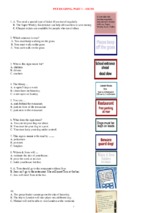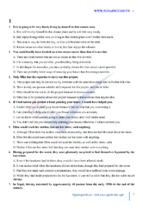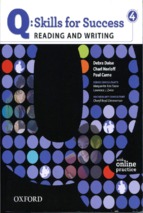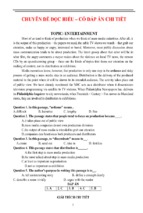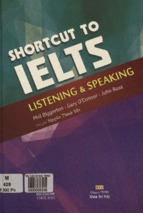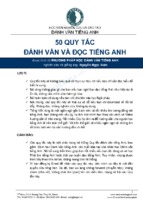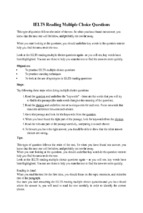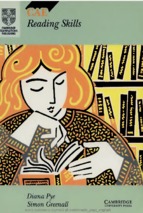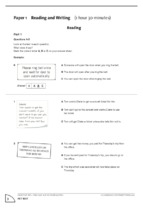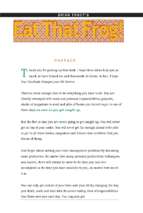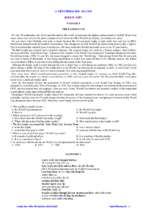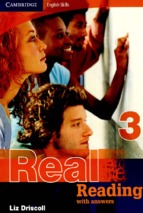The number-one magazine for learning and teaching English!
www.facebook.com/learnhotEnglish
www.twitter.com/learnHotEnglish
No.159
www.learnhotenglish.com
Learn some really useful phrasal verbs.
Life!
77 things to do
before you’re... 77!
Slang
Learn 8 useful slang terms.
Useful vocabulary
At the hotel, surprises, books,
“travel” phrasal verbs...
ISSN
15777898
9 771577 789001
00159
Murder mystery!
Listen to the ninth
part of our 10-part
murder-mystery The
Trouser Snatcher.
Poetry in
English!
astic
Listen to a fantis
h.
gl
En
in
poem
Plus… phrasal verbs, grammar, idioms, vocabulary,
useful expressions… and much, much more.
class
l
a
i
r
T NLY!
5
9
.
5
€
O
Learn
English…
l!
eria
t
a
m
+
Learn English
over the
phone!
…with Hot English Skype-phone classes!
Native English teachers.
Up to €40 of free materials.
Structured classes with clear objectives.
Competitive prices from just €9 per class.
Choose your timetable from 7am - 10pm (CET).
But don’t take our word for it, try out a...
...and then choose one of the four courses below.
1 Improve your
spoken English
2 Learn
business English
TRIAL LESSON
3 Be successful
at job interviews
(00 34) 91 455 0273
telephone-english
[email protected]
®
®
®
®
www.learnhotenglish.com
4 Pass
your exams
Editor’s intro
Magazine Index
How you learn English with Learn Hot English magazine
Why are you learning English? To get a better job, to pass an official English exam,
to travel, or just to communicate in English? Learn Hot English magazine helps with all this.
1 Increase
your vocabulary. In every issue of Learn Hot
English you’ll learn over 350 English words and expressions! Plus
you’ll learn lots of idioms, phrasal verbs, grammar and more.
2 Improve
your listening. Every magazine has 60
minutes of spoken English audio. You’ll learn to understand
English, plus you can hear lots of different accents!
for exams! Learn Hot English helps prepare
you for official English exams (First Certificate, IELTS, TOEFL,
etc.). How? Exams test your ability to speak and your range
of vocabulary. Hot English improves your communication
skills and your knowledge of words and expressions.
5 English
for life! Want to travel to English-speaking
countries? With Learn Hot English you’ll learn the words
and expressions you need for international travel!
6
3 English
4
English for speaking! How do native English
speakers really talk? Learn with our natural English
conversations. Also, learn English slang and read about
current events (news, culture, music, films) so you can
make conversation with native English speakers.
7 Want
English for work! Practical English for the office, for
meetings, for talking to clients – it’s all in Hot English.
Plus, read business tips from entrepreneurs.
to learn even more? Get a Skills Booklet!
You’ll learn extra vocabulary, grammar, social English
and business English. The Skills Booklets are linked
to the topics in Hot English magazine. They’re sold
separately – see page 25 for more information.
Hi everybody
and welcome to
another issue of
Learn Hot English
magazine – the
fun magazine for
learning English.
Have you been
up the Eiffel
Tower, crossed
the Golden Gate
Bridge, or written
a book? We’ve
got a fantastic
article on the
77 things you
should do before you’re... 77 years old. We’ve
also got an article on 24 really useful phrasal
verbs that you can use in everyday speech. Of
course, that isn’t all, and we’re also looking at
two rival bands, England’s most frightening
school, and the world’s most eccentric running
club, to mention just a few of the articles in
this month’s magazine. Well, we hope you
enjoy reading and listening to this issue of
Hot English magazine. Have fun, learn lots of
English and see you all next month!
Audio files
Download the MP3 audio files for
this issue for FREE from our website:
www.learnhotenglish.com/mp3s
PS Remember to sign up for the newsletter so
you can receive lots of FREE language lessons.
Just visit our website (www.learnhotenglish.com)
and enter your name and e-mail address in the
box on the right-hand side of the page.
Online and magazine advertising
Follow Hot English on Facebook
www.facebook.com/LearnHotEnglish
22
24
26
34
(00 34) 91 543 3573
Follow Hot English on Twitter
www.twitter.com/LearnHotEnglish
All material in this publication is strictly copyright, and all rights are reserved. Reproduction without permission is prohibited. The views expressed
in Hot English Magazine do not necessarily represent the views of Hot English Publishing SL. However, we also think that the Pareto principle is truly
wonderful, the Stones produced some marvellous songs, and librarians have a tendency to become violent at times.
3
4
5
6
7
8
9
11
Editorial
Swimming Squirrel Track 01
Depression Track 02
Dancing Health Track 03
Butler Demand Track 04
Elderly couple Track 05
Traditional English songs
Functional language:
Meeting someone again
Track 06 &
Story Time Track 07
12 Basic English: The Hotel
13 Social English:
The Hotel Track 08
14 Headline News
15 Cyber Criminal & Chocolate Lorry
Track 09
16 Trivia Matching
17 Weird Trivia Track 10
18 Dr Fingers’ Grammar
19 Subscriptions
20 Corny Criminals Track 11
21 999 Calls Track 12
& Song Track 13
22 24 really useful phrasal verbs
Track 14
24 Poetry in English Track 15
Pronunciation Track 16
26 77 Things to Do Before You’re 77
30 Grammer Fun
31 Jokes Track 17 ,
Graffiti Track 18 & Cartoon
32 Gun Dog & Litter Mystery
Track 19
33 Personality types Track 20
34 Face to Face
35 Phone Section Track 21
& Error Terror Track 22
36 Vocabulary & Typical Dialogues:
The Library Track 23
37 Dr Fingers’ Vocabulary Clinic:
Suprises Track 24
38 Quirky News Track 25
39 British abroad Track 26
40 Dumb US Laws Track 27
41 Books & Library Crossword
42 Dictionary of Slang Track 28
43 Idioms: House Track 29
44 Lonely Hearts Killers
45 Phrasal Verbs: Travel Track 30
46 Headline News
48 Recipe porridge & Answers
49 Pure Porridge
51 The Emperor’s Fish & Flaky
Employees Track 31
52 Trouser Snatcher Track 32
54 Expression of the Month:
The Pareto Principle Track 33
For Skype / Phone speaking classes, e-mail
[email protected] / www.learnhotenglish.com /
3
Track 01
News Stories
NEWS STories
Swimming Squirrel
Tourists see unusual swimmer.
Tourists on a boat in the north of
England had a big shock. They
were in the middle of a lake. All
of a sudden, they saw a squirrel
swimming. This is very strange
because it is difficult for most
mammals to swim. Also, squirrels
are very small, so it is even more
difficult for them. The squirrel had
swum 274 meters from the side of the
lake to the middle. It was eventually
rescued by the captain of the boat.
The squirrel was taken back to shore.
“We don’t know what the squirrel
was doing,” said Captain Edward
McGregor. Once back on land, the
squirrel disappeared quickly.
Online and magazine advertising
I’m going
for a swim.
GLOSSARY
a shock n
something surprising and not
expected
a lake n
an area of fresh water (not sea
water)
a squirrel n
an animal that lives in trees and
who has a bushy tail (a tail with a
lot of hair)
the shore n
the area of land next to the sea
on land exp
on the ground (not in the sea)
(00 34) 91 543 3573
No
Facebook?
Sign up for our
newsletter:
www.learnhotenglish.com
Follow Hot English on Facebook
www.facebook.com/LearnHotEnglish
4
/ www.learnhotenglish.com / For Skype / Phone speaking classes, e-mail
[email protected]
Follow Hot English on Twitter
www.twitter.com/LearnHotEnglish
Medical English
ts
c
e
ff
e
g
n
ti
ta
s
a
v
e
d
The
of depression!
Answers on page 48
Pre listening – Depression symptoms
Is depression a big problem in your country? Look at the list
of depression symptoms. Which ones are the most serious?
What is the best way of dealing with each problem? Discuss
your ideas with a partner.
Poor concentration/attention.
Loss of energy.
Significant weight loss or gain or appetite disturbance.
Insomnia or excessive sleeping.
Low energy level or chronic tiredness.
Loss of self-esteem, and/or self-deprecation.
A drop in school grades.
Forgetfulness.
Audio script
A recent study has shown that the numberone danger to our health is depression. For the
study, data from more than 245,000 people in
60 countries was analysed. The results showed
that depression had more impact on sufferers
than angina, arthritis, asthma, and diabetes.
“Depression needs to be a priority of health
systems worldwide,” a doctor said. “We need
to alert doctors and the public at large that
depression is a disease at least on a par with
physical chronic diseases in damaging health,”
she added.
On a scale of 0 to 100, with 0 indicating worst
health and 100 indicating best health, sufferers
of depression had an average score of 72.9. This
compared with 80.3 for asthmatics, 79.6 for
angina sufferers, 79.3 for arthritis sufferers and
78.9 for those with diabetes. “Our main findings
show that depression impairs health state to
a substantially greater degree than the other
diseases,” the doctor said.
Listening II
You are going to listen to an article about the effects of
depression. Listen once and say what these numbers refer to.
1. 245,000
2. 60
3. 72.9
4. 79.3
Listening II
Read the questions below. Listen again and see if you can
answer them.
1. What has a recent study shown?
2. What has the most impact on our health? Angina, arthritis, asthma,
diabetes or depression.
3. W
hat does depression need to be, according to one doctor?
4. What disease did the same doctor compare depression to in terms of
damaging our health?
5. W
ho had the worst health? Sufferers of angina, arthritis,
asthma, diabetes or depression.
FREE subscription if you recommend Hot English Language Services to your company. E-mail
[email protected] / www.learnhotenglish.com /
5
Medical English
Track 10
Track 03
Grammar
fun
Dance Health
n
a
c
g
n
i
c
n
a
How d
!
h
t
l
a
e
h
r
u
o
y
improve
Match each activity to the picture. (A-K). Answers on page 48
A
B
C
G
H
E
I
F
J
1
2
3
4
Dancing
Playing board games
Doing exercise
Reading
K
5
ment
Playing a musical instru
6
7
8
9
10
11
Listening to music
Playing tennis
Doing sport
Playing football
Swimming
Running/jogging
Mental health is a big problem in the UK. In
fact, dementia affects around 700,000 people
in Britain. One of the most common forms of
dementia is Alzheimer’s disease, which can lead
to severe memory loss.
However, scientists have found that there are
ways to prevent mental disease. Numerous
studies have shown that mental and physical
activity can help you stay healthy mentally.
6
D
These activities include playing a musical
instrument, reading, doing crosswords, learning
new languages and even dancing.
Dr Joe Verghese (from the Albert Einstein
College of Medicine in New York) carried out a
study on 469 people over the age of 75. At the
start, everyone was declared mentally healthy.
However, five years later, about 25% had
developed dementia.
During the study, each
person’s lifestyle was closely
monitored. Incredibly, scientists
found a direct link between
an active lifestyle and good
mental health. And as the
results seemed to show, those
subjects who used their brains
GLOSSARY
and bodies more often were
senile dementia n
a disease of the brain (the organ in
less likely to develop mental
the head) that affects old people
diseases. “Reading, playing
to carry out a study exp
to investigate something
board games, playing musical
a lifestyle n
the way you live: what you eat,
instruments and dancing are
what exercise you do, etc
associated with a reduced
a link n
a connection
risk of dementia,” a scientist
a brain n
involved in the study explained. the organ in your head that you use
for thinking
less likely to exp
not probably going to
Get dancing!
/ www.learnhotenglish.com / Want to do an internship with Hot English? For more information, e-mail
[email protected]
r
o
f
d
n
a
m
e
d
Why the
!
g
n
i
s
a
e
r
c
n
i
s
i
s
butler
Answers on page 48
Pre-listening
Have you ever been to a manor house? Who works
there? Match each manor house employee (1 to 8) with
the corresponding definition (A-H). Which of these jobs still
exist? Which one would you like to do? Why?
1. The gardener
2. The butler
3. The maid
4. The governess
5. The lord
6. The lady
7. The cook
8. The chauffeur
A. The male master of the house.
B: T he person who prepares the food in the house.
C: T he person who cuts the grass, trims the hedge, waters
the flowers, etc.
D: A woman who is in charge of the education of the lord and
lady’s children at home.
E: T he female mistress of the house.
F: A
woman who does the cleaning or cooking in the house.
G: A man who runs a house and attends to his master.
H: The person who drives the car.
Listening I
You are going to listen to a conversation about the
increasing demand for butlers. Listen once and say which
two famous people are mentioned. Can you write their
names? Who are they?
Listening II
Listen again and answer the questions below.
1. What images are conjured up when we think about butlers,
according to one of the speakers?
2. What were butlers, traditionally like?
3. Why are butlers making a comeback?
4. How do you go about getting a butler?
5. What’s the big problem at the moment?
6. How much can butlers cost?
7. What exactly will a butler do for you?
Butler Demand
Track 04
Audio script
Nigella: My name is Nigella Hunter and you’re
listening to Drivetime. Today, we’ll be
looking at the growing demand for
butlers. Here with me to talk about this is
someone who, no doubt, has a butler of
her own, Claudia Hanson. Hello, Claudia.
Claudia: Hello, Nigella. No, unfortunately I haven’t
got a butler, but I’d definitely like to have
one.
Nigella: So, tell me Claudia, is it true that this old
profession is getting a new injection of
life?
Claudia: Precisely. Thinking about butlers
usually conjures up images of the early
twentieth century and big aristocratic
houses. In those days, butlers often
ran whole houses very efficiently.
Traditionally, they were very modest, but
also very talented.
Nigella: So, why are they making a comeback
now?
Claudia: Well, it’s all to do with the nouveau riche
– the new rich. Britain’s been taken over
by a new class of people who have lots
and lots of money, often made selling oil
and in foreign business. Think of Roman
Abramovitch or Mohammed al Fayed
as good examples of this. These are
precisely the type of people who want
to have a butler, and the thing is, they
can definitely afford one.
Nigella: So, how do you go about getting a
butler?
Claudia: Well, the profession is very structured
and if you want to employ one, just as
in the old days, you have to approach
the correct employment agencies. The
magazine Country Life is also a good
place to start. But the big problem
is that there’s a national shortage of
butlers at the moment, and they aren’t
cheap. Some of the best can cost up to
£100,000 a year, and sometimes far more
than that.
Nigella: And they do everything for you?
Claudia: Well, everything within reason.
Nigella: Thank you very much, Claudia. That was
really interesting.
FREE subscription if you recommend Hot English Language Services to your company. E-mail
[email protected] / www.learnhotenglish.com /
7
Famous Couples
Track 05
!
it
o
d
y
ll
a
in
f
Elderly couple
Answers on page 48
Pre-listening
Audio script
Match each famous woman (1 to 5) with her Harry:
Good morning, and welcome to The Life Show. I have
lover (A-E). What do you know about each
with me one of our reporters Rebecca Lane, who has
one? What did they do? Why is their love story
news of a happy event. Hello, Rebecca, what can you
so famous?
tell us?
Egypt) and _____
1. Cleopatra (the last Pharaoh of
) and ____
2. Marie Curie (a famous scientist
en) and ____
3. Queen Victoria (an English que
4. Juliet and ____
Rebecca: Well, James Mason and Peggy Clarke are going to
get married in the town of Torquay in the south of
England.
Harry: That’s good news, but why is it so special?
Rebecca: Well, it’s special because James is 93 years old and
Peggy is 84 years old. In total, they have a combined
age of 176 years.
Harry: Well, that’s quite surprising. Do we know anything else
about their story?
Rebecca: Yes, James used to be a town mayor, and he met Peggy
when he was visiting a home for old people. He says
it was love at first sight. Peggy agrees. She says her
life “changed” the moment she saw Mr Mason on 7th
October at 12.10 exactly.
Harry:
But, why get married? I mean, if they aren’t going to
have children…
Rebecca: Well, they both say they want to get married because
they don’t want to “live in sin”. They are very traditional.
They also think that marriage is very important.
Harry: Well, thanks for coming in to tell us all about this today.
Rebecca: My pleasure.
Hillary:
Well, thank you for coming in to explain it all to us.
Ronald: My pleasure.
’s lover) and ____
5. Mrs Wallis Simpson (an English king
A. Pierre Curie (a French scientist).
B: Edward VIII.
C: Prince Albert.
D: Anthony (a Roman general).
E: Romeo.
Listening I
You are going to listen to a conversation about
an elderly couple: James and Peggy. Listen
once and write down both of their ages.
Listening II
Complete each space with the correct past tense
verb. Then, listen again to check your answers.
1. James __________ to be a town mayor.
2. He _________ Peggy when he _______ visiting
a home for old people.
3. H
e says it __________ love at first sight.
4. She says her life ___________ the moment
she _________ Mr Mason on 7th October at
12:10 exactly.
8
/ www.learnhotenglish.com / For Skype / Phone speaking classes, e-mail
[email protected]
This is another part in our series on nursery rhymes and their fascinating origins. This month:
Hush a Bye baby
This rhyme is also known as a lullaby
(a song for making babies go to sleep).
The words come from America, where
it was the practice of some Native
Americans to place a baby in a tree.
The movement of the wind rocked the
child to sleep. The words to Hush a Bye
Baby were first published in 1765.
Hush a bye baby, on the tree top,
When the wind blows the cradle will rock;
When the bow breaks, the cradle will fall,
And down will come baby, cradle and all.
GLOSSARY
Itsy Bitsy Spider
This song is used to create a “finger rhyme” for children. The
movements and actions of the rhyme help children improve
their manual dexterity. Children do the movements as
they repeat the words of the song. When the spider goes up,
children make their fingers go up into the air. When the rain
comes down, children make their fingers come down. And
when the sun comes out, they make a circle in the air.
Itsy Bitsy spider climbing up the spout,
Down came the rain and washed the spider out,
Out came the sun and dried up all the rain,
Now Itsy Bitsy spider went up the spout again.
Jack be nimble,
Jack be quick,
Jack jump over,
The candlestick.
Jack be Nimble.
Many people believe that
the “Jack” in the rhyme
is Black Jack, an English
pirate. He was notorious
for escaping from the
authorities in the late 16th
century. There is also a
reference to the old tradition
and sport of “candle
leaping”. This was practised
at fairs in England. Candle
leaping consists of jumping
over a burning candle.
to rock vb
to move from side to side with
regular movements
to hush vb
if you “hush” someone, you tell
them to be quiet
a bye baby exp
a baby who is about to sleep (this is
not a common expression)
a cradle n
a bed for babies
a bow n
a large, thick branch (stick) on a
tree
a finger rhyme n
a rhyme/song that children say/
sing while they are making
movements with their fingers
manual dexterity n
a good ability to do things with
your hands and body
a spout n
a long, hollow (empty) tube
through which liquids can travel
to dry up phr vb
to become completely dry (not
wet)
notorious adj
famous for something bad
a candle n
a stick of hard wax (a soft
substance) with a piece of string in
it. You burn it and it gives you light
to leap vb
to jump
a fair n
an event (often outside) with
games, competitions, food, prizes
burning adj
that has fire on it
nimble adj
with an ability to move your hands,
feet or body very quickly
a candlestick n
a metal object with a hole in it for
placing a candle
For great private language classes, e-mail
[email protected] / www.learnhotenglish.com /
9
Traditional
English songs
l
a
n
o
i
t
i
d
a
r
T
English songs!
If you want
to get a better job,
travel more, pass exams
or speak more fluently, start
improving your English with
Learn Hot English NOW!
Visit the shop on our website
www.learnhotenglish.com
/shop
Or
for some
fantastic discounts,
contact subscriptions
@learnhotenglish.com
Learn better English
for your future!
Magazines, books, classes, online solutions…
Learn Hot English has everything you need to improve your English.
And there’s so much to choose from:
Learn Hot English
magazine – reading
and listening activities
on language, film,
culture, music, travel,
the news, business,
pronunciation...
English Unlocked! –
a four-level course
with listening, reading,
pronunciation,
grammar, speaking
and vocabulary
activities.
Phrasal Verbs and
Idioms Booklets –
hundreds of useful
idioms and phrasal
verbs with audio files,
images and sample
sentences.
Travel English – all
the English you need
for travelling abroad
with dialogues,
images, exercises
and vocabulary
activities.
Skype-Phone classes –
speaking classes from
anywhere in the world
with trained native English
teachers and free materials!
Business English –
learn hundreds of the
most useful business
English words and
expressions, complete
with videos, listening
activities and
language exercises.
Plus, lots, lots more!
All our products are
available in digital formats too!:
www.learnhotenglish.com/shop
This month: meeting someone again.
A: How are you?
B: Fine thanks.
B: Oh, hi Jane. It’s been a while.
A: How’s it been going?
A: Hello, Mrs Hand. What a
Stor y
Time
Patient hope
A: Haven’t we met somewhere
A: Hi, Paula! How’s it going?
B: Not too bad. Busy as ever.
B: Yes, I think so. / No, I don’t
A:I’m sorry but I didn’t catch
A patient is talking
to his doctor hours
before having a big operation.
“Doctor, will I be able to play the piano after
the operation?” the patient asks. “Yes, of course,”
the doctor replies. “Oh, great!” the patient says.
“Because I never could before.”
B: It’s Sally. Sally Jones.
Clever teacher
(informal)
B: Oh, not too bad.
before?
think so.
A: I think we met in the
pleasant surprise!
B: Hi, Bob. How are you?
your name.
& Story Time
FunctionalLanguage
Track 07
Jokes, anecdotes and stories as told by native
English speakers.
Functional Language
Track 06
Useful language for successful communication.
conference last year, didn’t
we?
B: Oh, yes, that’s right. Now I
remember.
A: So, what have you been up to?
B: Oh, not much.
A: You’re from Germany, aren’t
A school teacher sends this note to the parents of
all her pupils on the first day of school.
“If you promise not to believe everything your child
says happens at school, I promise not to believe
everything your child says happens at home.”
A: It’s nice to see you again.
B: Nice to see you too.
B: Yes, that’s right. I was born
Poor communication
A: How’s it going?
B: Fine thanks.
A: Hey, Jane. It’s me. Sam.
you?
in Cologne, but I live in
Frankfurt.
A: It’s Ms Saunders, isn’t it?
B: Yes, that’s right. Please, just
call me Mary.
Three English language students are walking
down the road on their way to their listening
class.
“It’s windy,”says the first student.
“No it isn’t. It’s Thursday,” says the second student.
“Me too,” says the third student. “Let’s go for a
drink!”
Grammar obsession
The headmistress of a secondary school is
walking along the corridor. All of a sudden, she
sees a teacher coming out of the bathroom with
a thick marker pen in his hand. Curious, the
headmistress goes in to have a look. To her horror,
the walls are covered in graffiti.
The next day, the headmistress calls the teacher
into her office. “Mr Jones. You have been teaching
English with us for twenty years now,” the
headmistress explains. “We’ve been very pleased
with your work here, however, the other day I saw
you coming out of the toilets with a marker pen
in your hand. You know that writing graffiti on
school property is a serious offence.”
“Oh, no, I didn’t write those things,” the teacher
said. “I was just correcting the grammar.”
I’ve
seen the
writing on
the wall.
GLOSSARY
functional language n
language used for a particular
purpose: to say sorry, to say hello, to
say goodbye, etc
GLOSSARY
to be able to exp
this is the future of “can”
a note n
a message, often written on a piece
of paper
a pupil n
a student at a school
on their way to exp
if you are “on your way to” a place,
you are going to that place
windy adj
with a lot of wind (fast moving air)
Thursday n
one of the students says “Thursday”
(the day), but the other one
understands “thirsty” (with a desire
to drink)
a headmistress n
the female director/manager of a
school
a thick marker pen n
a pen that makes a thick (wide)
mark, and that can be used to write
on walls
Learn more! Get an idioms booklet! 300 useful idioms + audio files. For more information, visit: www.learnhotenglish.com / www.learnhotenglish.com /
11
This month: the hotel.
Basic English
l
e
t
o
h
e
h
T
Basic English
A hotel
A single room
(with a single bed)
A receptionist
A guest
A key card
A porter / bellboy
A bill
A bathroom
A mini-bar
12
A key
A credit card
A shower
A hotel manager
A double room
(with a double bed)
A cot
A safe-deposit box
A pillow
Air-conditioning
A twin room
(with twin beds)
A restaurant
Towels
A trouser press
/ www.learnhotenglish.com / Want to do an internship with Hot English? For more information, e-mail
[email protected]
A swimming pool
Track 08
Social English
l
e
t
o
h
e
h
T
Social English
This month: the hotel. Listen and repeat these expressions.
What you say
I’d like a room for the night / two
nights, etc.
I’d like a single room / twin room /
double room, please.
How much is the room per night?
I have a reservation under the name
of Smith.
Do you have a room with airconditioning / heating / television /
a balcony / a view of the sea?
Does the hotel have a restaurant / a
bar / a swimming pool / a garage / a
safe-deposit box / laundry service /
wireless internet connection / room
service?
Is breakfast included?
I’d like an extra bed, please.
We need a cot for the baby, please.
This room is too cold. / The room is
too noisy.
The light doesn’t work.
What time do we have to check out?
Could I have the bill now, please?
What’s this item on the bill?
What you hear
How many nights would you like to
stay?
What name was the reservation
made under?
Do you have a reservation?
Here’s your key. / Here’s your keycard.
I need to take down your credit card
details.
I need your name and address.
Do you have a passport with you?
The room is on the fourth floor.
The lift is just over there.
Would you like someone to help you
with your bags?
Breakfast is served between 7 and 11.
Check-out is at midday.
Shall I call a taxi for you?
Part II Now listen to this dialogue. In this conversation, Sally is checking into the hotel.
Good evening, can I help you?
Yes, I’ve got a reservation for a single room.
What’s the name please?
Jones. Sally Jones.
And how many nights are you staying?
I’ll be checking out on Monday morning.
Fine. So you’re staying for three nights.
Yes, that’s right.
You’re in room 245 on the second floor. Here’s your
key-card. The lift is just over there.
Sally: What time is breakfast served?
Receptionist: Breakfast is served between 7am and 10am. And dinner is served between
6pm and 11pm.
Sally: OK.
Receptionist: Please let me know if there’s anything that you need. Enjoy your stay.
Sally: Thanks a lot.
Receptionist:
Sally:
Receptionist:
Sally:
Receptionist:
Sally:
Receptionist:
Sally:
Receptionist:
GLOSSARY
a cot n
a bed for a baby
FREE subscription if you recommend Hot English Language Services to your company. E-mail
[email protected] / www.learnhotenglish.com /
13
Headline News
Headline News
Arkansas Anger
The voice of the people
Headline News N˚ 2
London 2015
Linguists get serious over spelling.
“I’ve been fighting against this all my
life,” said Professor Winscombe, after
he managed to convince authorities to
introduce a law on the spelling of the
possessive form of “Arkansas” . “According
to the rules of grammar,”
the professor explained,
“all words ending in
“s” should have an
apostrophe ’s’ added
to show ownership. So,
the possessive form
of Arkansas should
be Arkansas’s. But
the possessive form
is often written as
Arkansas’. This is wrong,
and now, thankfully,
the authorities have
introduced the
Arkansas’s Apostrophe
Act.”
A representative of the
government said, “Yes,
there are more pressing
matters we could
be dealing with, but
Professor Winscombe
has been asking me to
do this for decades. With
so many English, Dutch
and French explorers passing through
the state in its early years, Arkansas has
been spelled and pronounced at least
seventy different ways over the centuries,
but now we have a definitive ruling.”
Phrasal verbs booklets
Learn hundreds of phrasal verbs, really improve your
English and speak like a native speaker! Booklet
comes with listening files!
Get your Phrasal verbs booklets from...
www.learnhotenglish.com/shop
14
Booklets come with
images and audio files!
/ www.learnhotenglish.com / For Skype / Phone speaking classes, e-mail
[email protected]
Now
available
online!
The Anglo
Saxon Genitive
We normally use an
apostrophe “s” to
indicate possession.
For example:
a) This is Mary’s bed.
b) That is John’s bike.
However, when
someone’s name
ends in “s” (Charles,
Simmons, Jesus, etc)
there are two options
(despite what Professor
Winscombe says):
a) To add an
apostrophe after the
“s” = This is Charles’
room (pronounced
“Charl ziz”).
b) To add an
apostrophe and
another “s” = This is
Charles’s room.
GLOSSARY
ownership n
the state of possessing or having
something
a pressing matter n
an important topic that needs a
solution
to deal with phr vb
to try to find a solution to
a decade n
ten years
a ruling n
an official/legal/formal decision
Track 09
Cyber Criminal
Boy arrested for virtual robbery.
It’s the first time it’s happened, but it
probably won’t be the last. A Dutch
teenager has been arrested for
stealing virtual furniture from rooms
in a virtual hotel. The 17-year-old is
accused of taking tables, beds and
chairs worth more than 4,000 euros.
The furniture had been bought with
real money and was kept inside Habbo
Hotel*, a popular online game. As part
of the game, users can spend money
on furniture, which they can use to
decorate their rooms.
Apparently, the teenager tricked people
into revealing their passwords. This
allowed him to steal the furniture from
their rooms and take it to his own. Six
million people in more than 30 different
countries play Habbo Hotel each month.
“Virtual theft is a growing problem,” said
one of the software developers.
Help! I’m
trapped in
a virtual
world.
Habbo Hotel*
Habbo Hotel is a virtual community operated by the Sulake Coprporation. It is aimed at teenagers,
and combines two concepts: a chat room and an online game. In the game, “Habbos” (virtual
representations of the members) can buy furniture with credits which are bought with real money.
GLOSSARY
Chocolate Lorry
Experts excited by “sweet” fuel.
Scientists in England have tested a vehicle
that runs on… chocolate. The idea of the
project is to create a new type of fuel that
reduces carbon emissions. They also hope
to raise awareness of global warming.
The vehicle, a lorry, will be powered by all
sorts of popular chocolate bars. Eventually,
a team of drivers hope to drive the lorry
from England across the Sahara desert to
Timbuktu.
The idea for the chocolate lorry has been
developed by Ecotec. Their managing
director, Chris Elvey, said, “This isn’t new
technology. During the Second World War
the Germans did lots of research on biofuels. You can make it yourself at home in
just 20 minutes. And it’s cheap, safe and
environmentally-friendly”. The lorry is
expected to leave England very soon.
virtual furniture n
tables, chairs, etc that only exist on
a website
a virtual hotel n
a hotel that only exists on a website
to trick someone
into doing something exp
to convince someone to do
something for you by making them
think you are honest/genuine
to reveal vb
to show
to run on phr vb
if a vehicle “runs on” chocolate, it
uses chocolate to give it energy/
power
carbon emissions n
the CO2 (carbon dioxide) that
is produced when a machine is
working
to raise awareness exp
to make people know about
something or understand more
about it
global warming n
the theory that the world’s
temperature is increasing because
of pollution
a lorry n
a large vehicle for transporting
goods
to power vb
if a vehicle is “powered” by
chocolate, it gets its energy from
chocolate
environmentally-friendly adj
that does not harm/damage the
environment (the earth, air, water,
etc)
For great private language classes, e-mail
[email protected] / www.learnhotenglish.com /
15
News Stories
NEWS STories
Trivia Matching
TriviaMatching
Exercise
See if you can do this matching exercise. Look at the list of things (1 to 13),
and the photos ( A - M ). Write a letter next to the name of each thing in the list below.
Answers on page 48
1. A Christmas tree
2. A hot dog
3. A skunk
4. A target
5. A tooth
6. An ice hockey puck
7. A bear
8. A shark
9. A doorbell
10. Chopsticks
11. A typewriter
12. Honey
13. Shoes
A
B
C
D
E
F
G
I
H
J
L
K
16
/ www.learnhotenglish.com / For lots of great material to learn or teach English, visit our shop: www.learnhotenglish.com/shop
M
Track 10
This is another part in our mini-series on strange facts. Whoever thought the world was so unusual?
Christmas trees are edible.
Did you eat yours?
Pinocchio was made of pine.
The doorbell was invented
in 1831.
The porpoise is the most
intelligent animal on the
planet (not including
ourselves, of course!).
Skunks can hit a target as far
as 3 metres away. So, if you
ever see one turn its back on
you, run.
flowers is required to make a
litre of honey.
President
Teddy
Roosevelt
died from
an infected
Teddy Roosevelt tooth.
An ice hockey puck can travel
up to 190 km/h.
In the English parliament, the
“Speaker” of the House is not
allowed to speak.
A group of bears is called a
sleuth.
The cruise liner Queen
Elizabeth II needs a gallon of
diesel to move 18cm.
China is the biggest consumer
and producer of chopsticks.
Where else?
American
actor Tom
Hanks
collects old
typewriters.
The nectar
of 10 million
Tom Hanks
The English football club
Crystal Palace is the only club
with five consonants (CRYST)
at the start of its name.
The only McDonald’s
restaurant that sells hot
dogs is in Toronto (Canada).
Before American artist
Andy Warhol became
famous, he made his living
drawing pictures of shoes for
advertisements.
Italian mathematician
Geronimo Cardano was
famous for his accurate
predictions. However, he
wasn’t too good at predicting
his own death. He claimed
that he was going to die on
a certain
day in
1576.
However,
on the
day in
question,
Cardano
was still
very
much
alive
no
rda
Ca
o
Geronim
and
kicking. So, rather than lose
face, Cardano killed himself,
thus fulfilling his own
prediction.
GLOSSARY
a doorbell n
a button on a door that you press
and that makes a sound
a porpoise n
a type of dolphin
to hit a target exp
to hit the thing you are trying to hit
a puck n
a small, round object that is used in
a game of hockey / ice hockey
the Speaker of the House exp
a person in parliament who controls
the debate/discussion
a sleuth n
a detective
a cruise liner n
a large ship which takes passengers
on a long, pleasant journey visiting
many places
chopsticks n
thin sticks that some Asian people
use for eating food
a typewriter n
a machine for writing text
to make a living exp
the thing you do to “make a living”,
is the job you do to earn money
alive and kicking adj
alive (definitely not dead)
to lose face exp
to do something that causes others
to think less of you, or to laugh at
you
to fulfil vb
if you “fulfil” your own prediction,
you do what you said you were
going to do
Learn more! Get an idioms booklet! 300 useful idioms + audio files. For more information, visit: www.learnhotenglish.com / www.learnhotenglish.com /
17
Weird Trivia
WeirdTrivia
Fingers’ Grammar
Dr Fingers’grammar clinic
e.com
clinic@hotenglishmagazin
Question
Dear Dr Fingers,
s? I have the following
with a number of matter
Please could you help me
.
problems. Please help me
s it mean?
d “canapés”, and what doe
ner.
1. How do you say the wor Mrs Harrow request your kind presence at din
and
.
ner
din
for
2. Which is correct? a) Mr
ce
request your kind presen
tences:
Or, b) Mr and Mrs Harrow
meaning of these two sen
in
nce
ere
diff
the
is
at
3. Wh
?
”
it.
do
to
got
has
b) “He
a) “He has to do it.” And,
Yours, Wind Turbine.
This month:
Prepositions,
“have to”, “have got
to” & pronunciation.
Dear Wind Turbine,
Of course, I would be delighted to help you.
OK, here goes.
1. Basically, “canapés” are crackers (small, thin
pieces of bread or toast) with something on top
such as a bit of cheese, pâté, ham, etc. They are
often served as an appetiser (a bit of food that
you eat before the main meal). The word is from
the French “canapé”, which means “couch” (sofa).
The accent that goes over the “e” (“é”) makes
the letter sound like the pronunciation of the letter “a” (“eɪ” in
phonetic script). So we say “canapay”. There are other words
with accents at the end, such as “café” (pronounced “cafay”)
and “pâté” (pronounced “patay”).
2. There is a subtle difference between “at dinner” and “for
dinner”. Basically, we might use “at” as a preposition of place, to
indicate the position of the person. For example:
a) Where was he at 9pm?
English
Unlocked!
Your complete self-study solution for learning
English at home (with listening files)!
Reading, listening, pronunciation, vocabulary,
grammar, progress tests, listen-and-repeat and
much, much more.
Choose from four levels:
Pre-Intermediate (A2),
Intermediate (B1),
Upper
Intermediate (B2),
Advanced (C1)
b) He was at dinner.
(Sitting at a table eating
dinner.)
And we would use “for” to
indicate the purpose. For
example:
a) Why was he at the
hotel?
b) For the dinner.
3. There is no real
difference of meaning
between these two
sentences. Both “have
to” and “have got to”
can be used to refer to
an obligation. For example:
a) We have to leave now. = We must leave now.
b) We have got to leave now. = We must leave now.
However, “have got to” is more common in British English. Also,
there is a subtle difference in use in British English. We often
use “have to” to talk about general obligation. For example:
a) I have to work on Sundays.
b) I have to wear a suit to work.
And we use “have got to” to refer to an obligation on a specific
occasion. For example:
a) I have got to work next Sunday 3rd January.
b) I have got to wear a suit to work next week because there is
an important meeting.
Well, Wind Turbine, I hope that has helped you.
Yours, Dr Fingers. Please send your questions or stories to:
[email protected]
The
Web
School
Online learning with the Web School
Four levels:
Pre-Intermediate, Intermediate, Upper Intermediate
and Advanced Listening and video files!
Reading, speaking, listening, language, vocabulary
and writing activities.
Learn English online whenever you want!
Monitor your progress!
Unlock your
Unlock
English
yourwith…
English with…
www.hotewww.hote
nglishma nglishma
gazine.cogmazine.com
Upper Upper
Intermediate
Intermediate
(B2) (B2)
studentstudent
coursecourse
book book
CD 2 /CD
2 2/2
For more information:
products.learnhotenglish.com/english-unlocked
Hot EnglishHot
Publishing
EnglishSL
Publishing
2013
SL 2013
Books based on Skills Booklets from 2012-2013 + issues 103-130 of
Hot English magazine.
18
/ www.learnhotenglish.com / Want to do an internship with Hot English? For more information, e-mail
[email protected]
Try a demo:
webschool.learnhotenglish.com
Or contact us:
[email protected]
SUBSCRIPTIONS!
App
versions
available fo
12 months r
a year!
[email protected]
hotenglishgroup
Paseo de Extremadura,
21, Oficina 1A, 28011
Madrid, Spain
www.learnhotenglish.com
Suscripciones desde España (Spain only)
FREE Audio files!
Download the MP3 audio
files for this month’s
magazine from here:
www.learnhotenglish.
com/mp3s
Opción 1: Hot English para Estudiantes.
12 revistas* Hot English + audio MP3s + 1 Libro English Unlocked para estudiantes
(100 páginas, 4 niveles: Pre-Intermediate / Intermediate / Upper Intermediate /
Advanced): €78 Indica el nivel que desea (incluye 1 libro en el precio):
Opción 2: Hot English para Profesores.
12 revistas* Hot English + audio MP3s + 1 Libro English Unlocked para profesores
(110 páginas, 4 niveles: Pre-Intermediate / Intermediate / Upper Intermediate /
Advanced): €78 Indica el nivel que desea (incluye 1 libro en el precio):
Subscriptions from Europe / Rest of the World (ROW)
(NOT including Spain)
Option 1: Hot English for Students. Includes:
12 Hot English magazines* + audio MP3s + 1 English Unlocked Book.
(100 pages, 4 levels: Pre-Intermediate / Intermediate / Upper Intermediate /
Advanced): Europe €92.70 / ROW €108.90 Indicate the English
Unlocked level you require (one book included in price):
Book. (110 pages, 4 levels: Pre-Intermediate / Intermediate / Upper
Intermediate / Advanced): Europe €92.70 / ROW €108.90 Indicate the
English Unlocked level you require (one book included in price):
Option 3: Standard. Includes:
12 magazines* + audio MP3s = Europe €79.70 / ROW €95.40
para estudiante
Phrasal verbs / Idioms. Libros con 150 phrasal verbs o idioms +
Videos, readings, listenings, online exercises. 4 levels.
Indicate the level you require: Pre-Intermediate; Intermediate; Upper
Intermediate; Advanced. Code is valid for one level and one year = €24.99
Access to all levels: one year = €59.97
English Unlocked. Your complete self-study solution for learning English
at home. With audio MP3s and video MP4s! Choose from 4 levels: PreIntermediate; Intermediate; Upper Intermediate; Advanced.
Student or Teacher
Student’s / Teacher’s Book: Europe = €18.95
imágenes + audios MP3.
Phrasal verbs I
Europe per book= €17.95
Phrasal verbs II
/ ROW per book €18.95
/ ROW €19.95
Idioms I
Idioms II
Academies, institutes, official language schools, etc. photocopying Hot English
magazine for use in their classes wherever they are located are obliged to pay
a €50 surchage on top of their subscription in order to meet minimal copyright
requirements.
®
®
®
®
®
®
Please allow four to six weeks for delivery of your package.
* The magazines you will receive are from our Back Catalogue.
Visa/Mastercard _ _ _ _ / _ _ _ _ / _ _ _ _ / _ _ _ _
Fecha de Caducidad __ __ / __ ___
Para el pago con tarjeta, se cobra un cargo adicional correspondiente al 1% del precio total.
2. Domiciliación bancaria (Sólo España)
Número de cuenta _ _ _ _ / _ _ _ _ / _ _ / _ _ _ _ _ _ _ _ _ _
Banco:
Sucursal:
Dirección :
Código Postal:
®
There is an additional charge of 1% of the total amount for credit card purchases.
Por libro = €15,99
Por favor, marca esta casilla si no deseas recibir nuestro newsletter semanal gratuito.
Please tick this box if you do not want to receive our weekly free Newsletter.
Expiry Date __ __ / __ ___
Idioms II
Formas de Pago
1. Tarjeta de crédito
My personal details are: (Please, write in capital letters and clearly)
Surname:
Name:
Address:
Town:
Post code:
Phone number:
E-mail:
Age:
Visa/Mastercard _ _ _ _ / _ _ _ _ /_ _ _ _ /_ _ _ _
Idioms I
Mis datos personales son: (Por favor, escribe de una manera clara y en mayúsculas)
Nombre:
Apellido:
Dirección:
Código Postal:
Población:
Número de teléfono:
E-mail:
Edad:
DNI/NIF:
All four books (10% discount) Europe €66.25 / ROW €74.50
Form of payment:
Credit Card
Phrasal verbs II
Los cuatro libros (descuento 10%) = €58,50
Con el objeto de cumplir con los requisitos mínimos de aplicación del copyright,
aquellas academias, institutos y escuelas oficiales de idiomas que fotocopien la
revista Hot English para uso colectivo en sus clases, cualquiera que sea su ubicación,
deberán abonar obligatoriamente una comisión de 50€ adicional a su suscripción.
Phrasal verbs / Idioms. Booklets with 150 phrasal verbs or idioms +
images + MP3 audio files. Phrasal verbs I
o para profesor
Todos los niveles (descuento 10%) = €59,10
Option 4: Web School.
All four levels (10% discount) Europe €73.80 / ROW €90
Opción 3: Estandar.
12 revistas* + audio MP3s = €64,50
Opción 4: Web School.
Videos, lecturas, grabaciones, ejercicios online. 4 niveles:
Indica el nivel que desea: Pre-Intermediate; Intermediate; Upper
Intermediate; Advanced. Duración del código por nivel: un año = €24,99
Acceso a todos los niveles: un año = €59,97
English Unlocked. La solución definitiva al aprendizaje del inglés en
casa. Incluye audios en formato MP3. Niveles disponibles: Pre-Intermediate;
Intermediate; Upper Intermediate; Advanced = €16,50
Option 2: Hot English for Teachers. Includes:
12 Hot English magazines* + audio MP3s + 1 Teacher’s English Unlocked
NOW!
✃
Get
the
Hot
English
App
Subscri
be
(00 34) 91 549 85 23
®
3. Cheque a Hot English Publishing S.L. (Sólo España)
4. Transferencia bancaria a HOT ENGLISH PUBLISHING SL (sólo España):
0081 5229 71 0001111813
El paquete puede tardar entre cuatro y seis semanas en llegar.
* Las revistas que recibirás son de nuestro Back Catalogue.
For lots more material, visit www.learnhotenglish.com/shop
Track 11
Corny Criminals
s
l
a
n
i
m
i
r
C
Corny
Here’s another part in our series on good, bad and funny criminals.
the site and pasted them
into his own site, claiming
the dog was his. On the web
page, the thief described how
“his” dog had given birth to
puppies, and that they were
on sale to potential buyers for
1,500 euros each. The scam
was spotted by a woman
who was looking for a poodle
on the internet. She became
suspicious after noticing that
photos of Zappy revealed that
he was in fact a male. Police
are investigating.
Where
would you
like to go?
Terror Alert
Bear Necessities
Bear demonstrates driving
abilities.
“We’ve heard of animals
breaking into houses, but
this is the first time an animal
has taken a car,” said a police
spokesperson after a bear was
suspected of stealing a car and
driving it along a road. Police
found the car by the side of
the road near a town in New
Jersey. The passenger window
had been broken. “We’re fairly
sure that it’s a bear because
of all the bear hair inside,”
the police officer explained.
“He must have released the
hand brake and allowed the
vehicle to move 10 or twenty
metres.” Police believe the bear
was attracted by some sweets
inside the car.
K9 Theft
Dog loses his identity.
You’ve probably heard of
online identity theft, but
this is the first case involving
an animal. Zappy, a dog from
North Wales, has become
the first victim. Details of the
two-year-old poodle were
posted on the internet by
owner Betty Month. But a
thief copied the details from
Ex-terrorist seeks employment.
The director of a jobnetworking website
contacted the police after
noticing the following
classified on his internet site.
“During terrorist training
in Afghanistan, I gained
experience of other cultures
working inside major
international organisations. I
also have a lot of experience
in co-ordinating projects,
and I’ve gathered valuable
experience in building
connections in Europe and the
USA for many years. I would
be willing to take up work in
Poland as soon as possible.”
Travel English
Learn over 500 useful words and expressions for travelling abroad.
40 topic areas covering a wide range of typical situations.
Over 400 images to help you learn the words and expressions.
More than 30 dialogues so you can hear the language in action.
For more information, visit: www.learnhotenglish.com/shop
20
I’m the
victim of
an online
crime.
/ www.learnhotenglish.com / For Skype / Phone speaking classes, e-mail
[email protected]
GLOSSARY
a bear n
a large mammal that lives in forests
and likes eating honey. Winnie the
Pooh was one
fairly sure exp
almost certain
to release vb
to free
a hand brake n
a lever in a car that you control with
your hand and that you use to stop
the car from moving
online identity theft n
stealing personal and private
information about someone from a
website
a poodle n
a type of dog with thick, curly hair
(hair with little circles)
to post vb
to put text or images on a website
to paste vb
to put text or information into a
document that you have copied
from another document
a scam n
a trick in order to get money illegally
or dishonestly
to spot vb
to notice or see
a male n
a man
a job-networking website n
a website in which you can find jobs
or offer work
a classified (ad) n
a small piece of publicity offering
something or asking for something
to take up work exp
to agree to do a job; to accept a job

